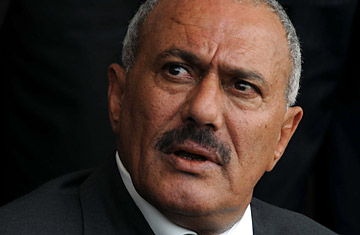
Yemeni President Ali Abdullah Saleh attends a pro-government rally in Sana'a, Yemen, April 1, 2011.
When gunshots rang out at dawn on Friday, most Yemenis in the capital city of Sana'a thought it was just more of the same. Battling troops had plunged this deeply tribal and heavily armed country into five days of bloodshed. But the early morning shots on Friday sounded different: louder, more insistent perhaps, more widespread. And with fireworks popping in the distance, and jubilant songs blaring from rooftops, it became clear that these were not gun battles, but government loyalists celebrating the surprise return of President Ali Abdullah Saleh.
For better or worse, many Yemenis thought they had seen the last of Saleh, who had been recuperating in Riyadh after being badly burned in a bomb attack in Sana'a in June. Saleh's sudden reappearance capped off nearly a week of violence in the capital, where more than 100 protesters were shot dead, some by government troops using anti-aircraft guns. A clampdown on a public rally last Sunday had ignited a full-blown military confrontation between Republican Guards, led by Saleh's son and heir-apparent, Ahmed, and a division of renegade soldiers who have been backing the country's pro-democracy demonstrators. The two sides are now hurling mortars and anti-aircraft missiles at each other as they scramble for control of the capital.
"I return to the nation carrying the dove of peace and the olive branch," Saleh was quoted as saying by state television, which showed footage of the wounded president clutching a walking stick and gingerly descending the stairs from a private jet at the Sana'a airport. Shortly after his arrival, he called for a ceasefire between the dueling forces. "The solution is not in the mouths of rifles and guns, it is in dialogue and stopping bloodshed," the defense ministry cited him as saying. But Saleh's plea for peace did not bring the violence to a halt. At least 40 people were killed in the capital on Saturday, some by falling mortars and others by sniper fire, as the shelling match between the two sides intensified.
In less than a week, a large area in the heart of the capital — dubbed Change Square by the thousands of dissidents who had been camping out there in tents — has been transformed from a pro-democracy hub to one of chaos and despair. Blood-splattered tents have been ripped open by mortar shells. Protesters are distributing plastic helmets in a desperate attempt to protect themselves from the bullets of plain-clothed pro-government snipers prowling the nearby rooftops. Meanwhile, the camp's field hospital arranges mangled corpses in neat rows, arms, legs, even faces missing, their gaping wounds shocking evidence of the rocket-propelled grenades and anti-aircraft guns now being used against activists by pro-regime forces.
Despite Saleh's return, many diplomats are still hoping that the strongman will accept a deal drawn up by the Gulf monarchies in April that offers Saleh and his family immunity from prosecution in return for him stepping down within three months. He agreed three times to earlier drafts of the deal only to back out at the last minute.
For now, though, his intentions remain a mystery. Rumors circulating on Friday that he was preparing to address his party, the General People's Congress, and announce his immediate resignation proved unfounded. The longtime ruler has spent the last six months peddling hollow political concessions while deftly sidestepping international calls for his resignation. Experts say that by returning to Yemen and then resigning, Saleh could expose himself to the risk of prosecution, a possible explanation for his hesitancy. Others believe that he may still be grooming his son to take over the reins.
As Saleh dithers, time is running out for Yemen. Ali Mohsin, the wayward general whose troops are currently fighting loyalists, lashed out at Saleh in a statement on Saturday calling him a "sick, vengeful soul" and comparing him to the Roman emperor Nero, wasting time as his city burns. Mohsin, who once served as the president's iron fist and controls more than half of the country's military resources and assets, defected to the opposition in March after 52 protesters were shot dead in a coordinated sniper attack. However, he shouldn't be seen as a champion of democracy, having crushed an uprising in northern Yemen, a brutal act that also displaced millions of people.
Perhaps the biggest fear the country faces is that Saleh's reappearance may draw Yemen's powerful tribal leaders back into fray. When Saleh was airlifted to Saudi Arabia in June after a booby trap exploded in the mosque in his compound, Sadeq Al-Ahmar, the grizzled sheikh at the head of Yemen's most influential tribe, the Hashed, swore "by God that he would never let Saleh rule again." Sadeq, one of the wealthiest and most outspoken figures in Yemen, had been allied with Saleh until March when he announced his support for the "peaceful youth movement." Now he's being looked on as the power that might unsettle Saleh from his perch. The last time hostilities between his family and Saleh's turned violent was in May when a week's worth of mortar battles erupted, killing hundreds and flattening an entire neighborhood in Sana'a where Sadeq's home was located. Heavy explosions ripped through the same neighborhood on Friday night.
Saleh is expected to address the nation in a live, televised speech Sunday evening. He would do well to choose his words carefully. The direction this crisis-hit county takes after six days of brutal violence could well hinge on them.
